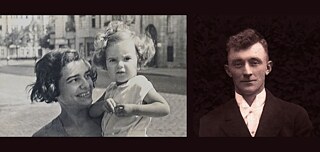Reading and Discussion
Who was Fritz Kittel?

A German Railway Worker Decides, 1933–2022
In 2023, Esther Dischereit created an exhibition in cooperation with Deutsche Bahn to honour the railroad worker Fritz Kittel. In 1944 and 1945, he hid her mother Hella and sister Hannelore, who as Jews were persecuted by the Gestapo and threatened with death in Germany under National Socialism. They were liberated by U.S. troops in 1945. Dischereit began to search for the family of the rescuer. She found them in 2019, when she also learned that Fritz Kittel had never told his own family about his courageous act.
Esther Dischereit's literary response in 17 text pieces includes other found objects from the lives of her mother, sister, and Fritz Kittel, and they offer a dialogue with those who are now the daughters and sons or grandchildren. False information given at a registration office, illegal names and addresses ... What do we read when we read these documents? What do we see when we look at these photos?
Reading: Esther Dischereit together with Jonny Ball.
This event is a collaboration between the Leo Baeck Institute London and the Goethe-Institut London.
Details
Senate House, University of London
Room G3, Senate House
Malet Street
London WC1E 7HU
@@country@@
Language: English
Price: The event is free but booking is essential